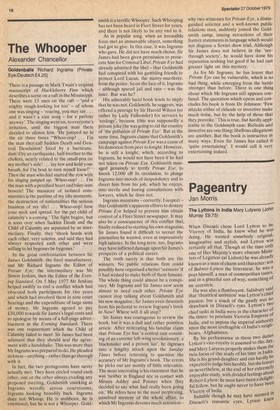Pageantry
Jan Morris
The Lyttons in India Mary Lutyens (John Murray £9.75)
When Disraeli chose Lord Lytton to be Viceroy of India, he knew what he was doing. He wanted somebody original, imaginative and stylish, and Lytton was certainly all that. Though at the time onlY one of Her Majesty's more obscure Ministers of Legation (at Lisbon) he was already known as a man of charm and character: son of Bulwer-Lytton the litterateur, he was a poet himself, a man of cosmopolitan tastes, and in a graceful sort of way, something of an eccentric. He was also a flamboyant. Salisbury said, that 'theatrical ambition' was Lytton's chief passion, but a touch of the gaudy was no drawback in Disraeli's eyes. Lytton's two chief tasks in India were in the character of the times: to proclaim Victoria Empress of India, and to impose the imperial authority upon the most irrefragible of India's neighbours, Afghanistan. By his performance in these two duties Lytton's vice-royalty is assessed to this day, and Mary Lutyens properly makes them the twin focus of this study of his time in India. She is his grand-daughter and can hardly be expected to judge him harshly, but she leaves us nevertheless, at the end of her extremelY enjoyable study, with divided feelings about Robert Lytton: he must have been a delightful fellow, but he ought never to have been Viceroy of India, Suitable though he may have seemed in Disraeli's romantic eyes, Lytton knew nothing whatever about India, was pitifully ill-suited to its demands, despised most of its society, hated its climate and scorned all its conventions. Why did Englishmen go to India at all, a Maharajah once wondered during a visit to Curzon's Kedleston, when they could stay at home in comfort 'playing the flute and watching the rabbits'? Poor Lytton, slaving away migrainous in the heat, must often have felt the same.
Like all Mary Lutyens's books, The Lyttons in India is impeccable (well, virtually impeccable — I did notice an odd bit of grammar on page 175, and there isa mis-title in the bibliography, I think). Cool, amused, gently ironic now and then, she examines with scrupulous dispassion the chief themes of her tale: the preposterous goings-on at the 1876 Durbar, when at Lytton's instance all the princes were supplied with embroidered banners of their armorial bearings, and the tragic events at Kabul in 1879, when through Lytton's policies the British Mission to Afghanistan was massacred almost to a man.
As to the first affair, in the context of the times it was evidently a success. Clearly Lytton was indulging his somewhat immature taste for the pompous and the stagy (he Personally directed the amateur theatricals at Simla), arid later imperial Durbars, which were all modelled upon it, were seen by Indians as deliberately degrading to them: but in the years after the Indian Mutiny the tinsel pageantry of it all seems to have Pleased the populace and consolidated the loyalty of the feudatories.
As to the second event, Miss Lutyens appears to accept Lytton's arguments that if British authority were not exerted upon Kabul, the country would be lost to the Russians. Like Lord Salisbury, I take this With a pinch of salt, and am not convinced by the evidence of Russian skull-duggery marshalled here: but if Lytton really believed it himself, then there are cogent arguments for the action he took.
Lord Lytton went home early, the Conservatives having fallen from power partly because of his own performances and later became an exceptionally successful Ambassador in Paris, There his quirks of dress, behaviour and opinion were all io his favour, and the local populace did not in the least mind seeing the Ambassadorial coach draw up outside a public lavatory while Her Britannic Majesty's plenipotentiary paid a visit. In Calcutta and Simla such cheerful improprieties were not so popular, and Lytton's original attitudes made him many enemies. As he said himself, '1 devoted my life to India, and everybody abuses me for One sympathises of course (though actually it was only four years of his life), but Still the moral of this fascinating book is a sombre one: it is not men of charm who make and keep Empires, not lolling poetical statesmen of Bohemian tastes, but solid mean and arrogant, men of rules and prejudices, who keep their distance, and know their place, and would not be seen dead entering a Parisian pissoir.



































 Previous page
Previous page